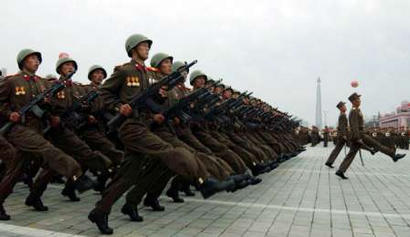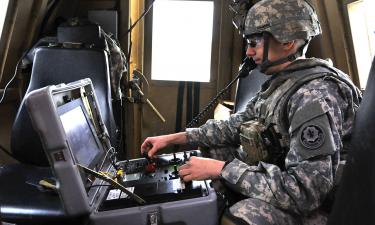World superpowers determined to diminish North Korea's nuclear ambition
Some experts do not believe North Korea is capable of building its own nuclear weapons
There is no confirmed information with respect to North Korea's possession of nuclear weapons. Specialists and experts have a wide range of opinions on the subject. Some experts including a few American ones claim that North Korea has built several nuclear warheads. The warheads vary in number from one or two to a dozen. The estimates are based on intelligence data and reports by North Korean defectors. They are also based on the assumption that North Korea has enough enriched uranium to make nuclear weapons. Le Monde has recently run an article about a one-ton nuclear bomb manufactured in North Korea out of 4 kilos of plutonium. The newspaper cited a defector who dubbed himself Kim Il Do. 
Other experts do not believe North Korea is capable of building its own nuclear weapons. They point out that reserves of enriched uranium are not enough to make a bomb. North Korea should also use high-tech methods and production facilities to implement its nuclear weapons program. North Korea has none of the above at the moment. Besides, no tests were conducted to prove that the end product can really work.
There is yet another group of experts who say that North Korea might have built some nuclear device but it is too early to call it a weapon. The experts say the device should be made compact enough to be mounted on missiles. Missiles should be available too. The assessment is probably logical with respect to Pyongyang's potential retaliatory actions against the U.S. As regards such U.S. allies in the region as Japan and South Korea, North Koreans can use submarines and most primitive seagoing craft for delivering the nuclear device to above countries. They can also cause radioactive pollution in those countries by detonating the nuclear device over their own territory when the wind rose is right.
All these speculations make no sense for there is no way of verifying information about things North Korea really has. Therefore, future actions should be planned by taking into account the statements by North Koreans about nuclear weapons allegedly in hand. The assumption that North Korea has nuclear weapons offers yet another challenge to the international community. The spread of nuclear weapons across the region may become a reality. Taiwan and Japan may become the prime sources of danger.
Taiwan was developing its military nuclear program in the 1960s and 1980s. Eventually, the program was put on hold due to U.S. pressure. Americans were afraid that China might launch a similar program in retaliation. Bearing in mind that China is fully poised to regain the island, no action can be ruled out including the use of military force on the part of the Chinese. Under the circumstances the Taipei authorities can resort to extreme measures. Taiwan has full-fledged production and technological potential for building nuclear weapons and means of delivery.
Despite the horrible experience of atomic bombings and hence a solid immunity from the nuclear weapons in Japan, several Japanese politicians have been openly discussing the possibility of building weapons of mass destruction. For example, leader of the influential liberal party Ichiro Odzava made the following comment back in April 2003 as he spoke about China's growing military muscle: “The amount of plutonium Japan has at its nuclear power plants is good enough for the production of three or four thousand of nuclear warheads.” Experts estimate that Japan can produce a nuclear weapon within six weeks. Japan and China have long argued over islands at the southern end of Japan's chain thought to have oil and gas deposits. Meanwhile, the demand for oil and gas is getting increasingly higher both in Japan and China. In light of the above, an armed conflict between the two countries can not be ruled out.
The world peace may be under threat due to nuclear weapons proliferation in a region where disputes and conflicts between the neighbors still linger. That is why it is essential to persuade North Korea to relinquish its nuclear weapons program. The Korean Peninsula should be turned into a zone free of nuclear weapons with subsequent steps to stop the spread of nuclear weapons in the region. The six-party talks in Beijing are the first step on the long and winding road. The chances for a breakthrough during the fourth round of talks are slim, though. The outcome of the talks wholly depends on goals of the main opponents i.e. North Korea and the United States.
It is a good sign that North Korea has agreed to resume the talks. North Korean authorities are apparently interested in finding a solution to the crisis through diplomatic ways. Neither the Americans who took a tough stance on the issue nor the international community who put pressure on North Korea is responsible for persuading Pyongyang to get back to the conference room. The main reasons behind the decision of North Korea refer to internal political and ideological aspects of North Korean reality. Part of them had to do with official propaganda aiming to cement North Koreans and the regime even more firmly. North Korea's economic difficulties were a big factor too. According to the U.N. World Food Program, the threat of a widespread famine and the lack of food products in North Korea are growing due to decreasing amounts of foreign humanitarian aid. The World Food Program received only 15 thousands tons of food supplies for North Korea last year. At least 215 thousands tons of food are required to feed the country.
A few days ago North Korea asked the U.S. again to sign a peace agreement prior to the beginning of the next round of talks. North Koreans repeatedly asked Americans to come into a peace agreement in the past. The U.S. administration invariably refused to do so. This time around the American reply was quite predictable. Nevertheless the previous history, North Korea found it necessary to call on Washington again. North Koreans pointed out that the signing of an agreement would put an end to the hostile U.S. policy on North Korea. North Korean leaders wanted to swap their nuclear weapons programs for security guaranties and foreign aid to support the market reforms.
According to North Korean officials, North Korea is going to pull out of talks and focus on issues related to unification with South Korea should the talks end in failure. South Koreans seem to be setting the ball in motion too. Beginning May this year, a number of official bilateral talks have been held. The bilateral talks were suspended in 2004 following accusations put by Pyongyang against Seoul which allegedly kidnapped North Koreans.
Preparations are under way to hold another round of bilateral military talks in the demilitarized zone. The talks between the generals are scheduled for this August. The talks are expected to focus on issues pertaining to the removal of propaganda equipment still installed along the 249-km zone. The talks also aim to coordinate necessary measures to prevent potential conflicts from bursting out in the disputed sectors of marine border area of the Yellow Sea. The economic cooperation between the two countries is also picking up. In particular, South Korea agreed to increase the amount of its humanitarian aid to North Korea, 500 thousand tons of rice will be shipped to North Korea in the nearest future. On the other hand, North Korea agreed to allow South Korea to invest in its mining industry e.g. production of zinc, magnesium carbonate, and coal. Seoul also promised to supply an annual 2 million kilowatt of electricity to North Korea if the latter relinquish its nuclear weapons program.
The above developments indicate that South Korea is conspicuously backing out of the “automatic solidarity” with the U.S. and Japan as to the settlement of the situation around North Korea.
Some experts believe that the U.S. was actually forced to change its attitude due to several reasons. Americans seem to have stuck in the quagmire in Iraq and the death toll is rising. Having proclaimed itself the world leader, the U.S. had to face other challenges including terrorism, nuclear weapons proliferation, trade protectionism, climate change. The same applies to the nuclear threat posed by North Korea. The U.S. alone can not persuade North Korea to relinquish its nuclear weapons program. Americans can bring out regime change in North Korea only by launching an invasion the way they did in Iraq. However, the U.S. has lost its military options following the occupation of Iraq. Besides, U.S. military operation against North Korea will entail a great deal of opposition from South Korea, Japan, China, and Russia. President Bush lays special emphasis on a six-party format of the talks where several participants could do a better job in persuading North Korea to give up its nuclear ambitions.
Meanwhile, U.S. hawks still maintain a strong position at the American political scene. They still remember a “slap in the face” from the North Korean regime 52 years ago during the conflict in Korea. The hawks also need North Korea as part of the ongoing competition between the U.S. and China for winning the title of the region's most powerful country. That is why they persistently call for regime change in North Korea and take steps designed to set back the talks. As regards the agenda of the upcoming six-party talks, the House of Representatives passed a resolution which recommended that U.S. government raise the issue of South Koreans and the Japanese kidnapped by North Korean intelligence. The resolution regards the role of North Korean authorities in the events as an “act of terrorism and a grave violation of human rights.” Japan also wants to discuss the above issue.
The next few days will show who is going to get the upper hand in the American delegation at the talks in Beijing. As regards the positions of Russia and China, both the countries mostly share the same views on the problem. Russia and China believe that there are real opportunities to compromise and resolve the situation in a mutually acceptable way which takes into account the interests of all parties involved. “Taking steps to ensure that the Korean peninsula is an area free of nuclear weapons remains the ultimate goal of the talks,” says a statement released by the Russian Foreign Ministry.
Subscribe to Pravda.Ru Telegram channel, Facebook, RSS!



